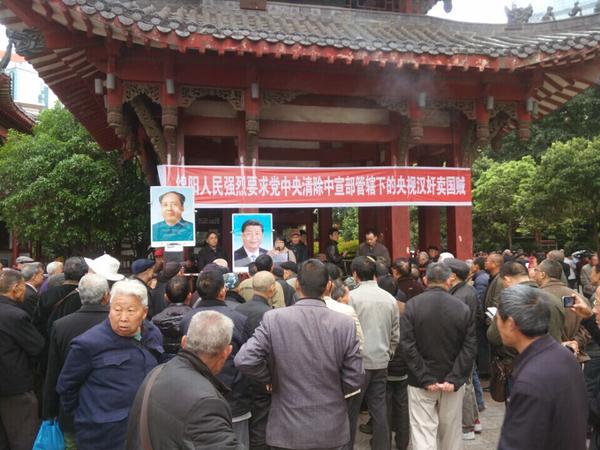After candid cellphone footage showed star CCTV anchor Bi Fujian mocking Chairman Mao in a comic rendition of the song “We are Worker and Peasant Soldiers” from the red opera “Taking Tiger Mountain by Strategy,” Bi’s programs were suspended for a week and state media said he had no one to blame but himself. The video was ordered offline by censors, and in an online debate about Bi and privacy in the digital age, many brought up similarities to the Mao era. From his Weibo account, journalist Liu Hu shared a photo of a public gathering reminiscent of the Cultural Revolution:
JournalistLiuHu (@记者刘虎): At a gathering in the Tieniu Public Square, in Mianyang, Sichuan, people are angrily denouncing a traitor and treasoner from CCTV (April 9, 2015) [Chinese]
During the Cultural Revolution, Mao adopted “big character posters” (大字报)—used in China to communicate political messages since imperial times—as crucial tools for spreading revolutionary propaganda. They were often used to denounce counter-revolutionaries. Commenting on the scene, Weibo-user XuefeiFred (@薛飞Fred) said, “Look at the bad names they’ve got tacked up there. Sure looks like the Cultural Revolution, doesn’t it?” (瞧这帽子给扣的,像不像文革时期?). Referring to the mass denunciation rallies that often occurred in public squares amid the fervor of the Cultural Revolution, Zhimalüdounaxiexiaoshir (@芝麻绿豆那些小事儿) asked, “Are public criticism rallies still a thing?” (是不是还得开个批斗会啊!).
At the New York Times, Chris Buckley notes ambiguity concerning Mao’s legacy within the Party today, and surveys comments from the lively Weibo debate about Bi Fujian’s debacle. The Times draws attention to a comment on Bi’s firsthand experience during the Cultural Revolution:
Mr. Bi, 56, came of age during the 1966-76 Cultural Revolution, Mao’s tumultuous bid to cleanse the party and society of ideological deviance, and spent three years “sent down” to the countryside as part of Mao’s program, noted one online commentary.
“The core evidence used to condemn Bi is his comment that Mao Zedong ‘tormented us,’” it said. “Was that comment really so wrong?”
That commentary and other defenders of Mr. Bi noted that even official assessments of Mao have been ambivalent. The party’s decision on history, which Deng Xiaoping oversaw in 1980-81, in an effort to shore up Mao’s battered status, nonetheless noted that Mao had brought on calamities during his later years, including the Cultural Revolution.
Under Mr. Xi, though, the party has imposed even tighter censorship on public discussion and research about Mao’s era. […] [Source]
Xi’s further tightening of controls on the media comes amid his own drive to broadly enforce ideological orthodoxy—within the Party, institutions of higher learning, and society at large—which has prompted contested comparisons with the Mao era. Liu Hu, the muckraking journalist who shared the photo from Mianyang, was himself jailed for nearly a year in 2013 after posting allegations of official corruption amid Xi’s crackdown on online rumors.








